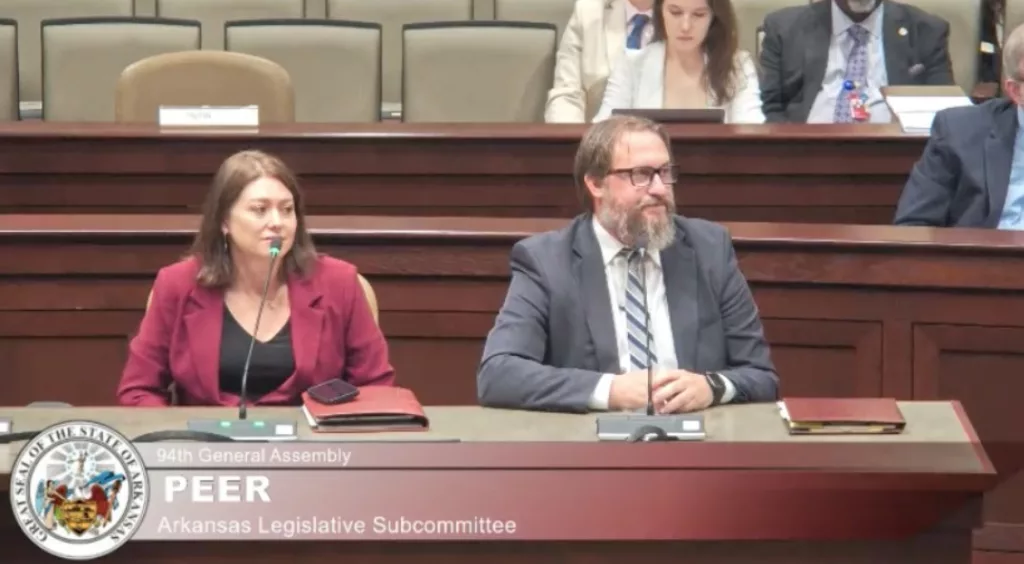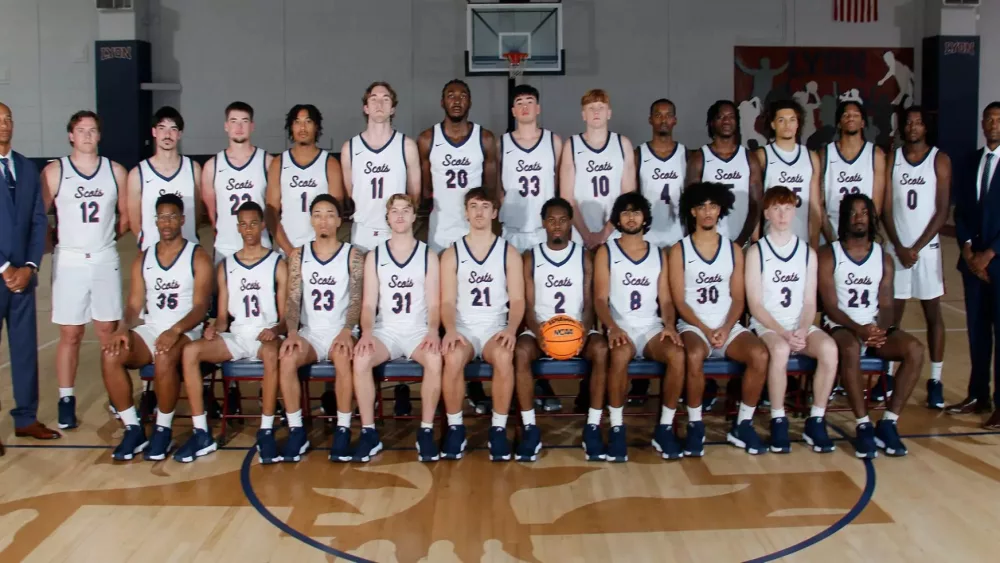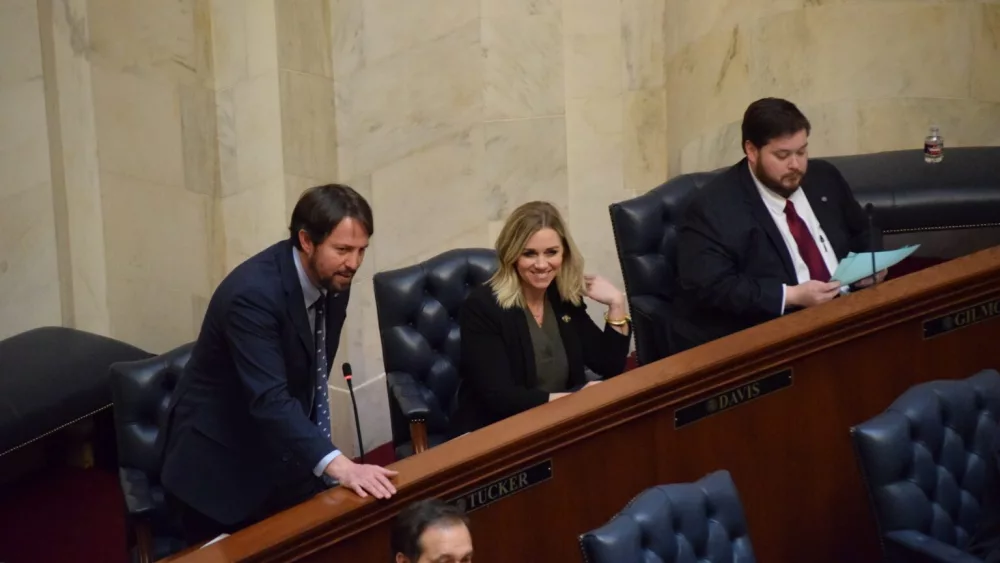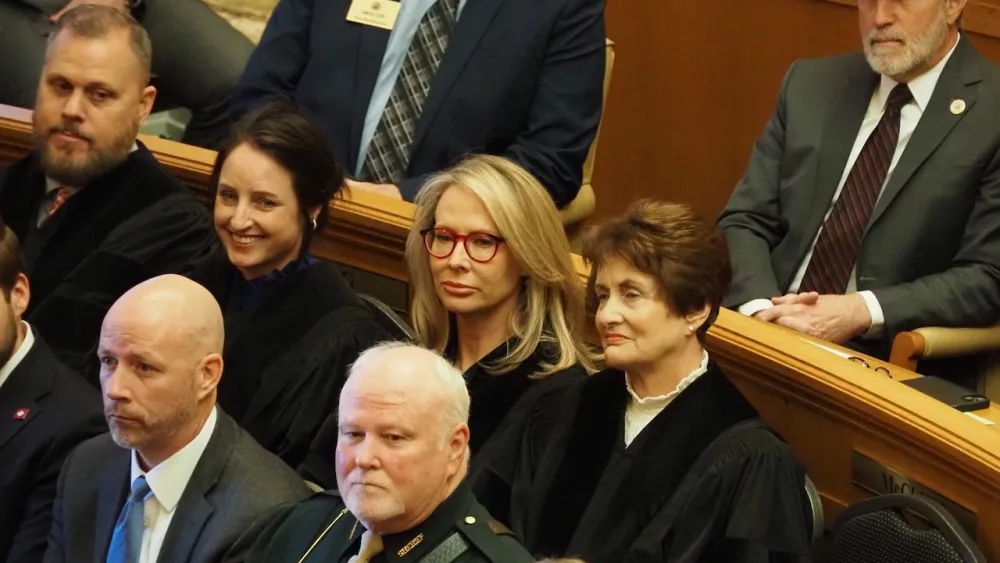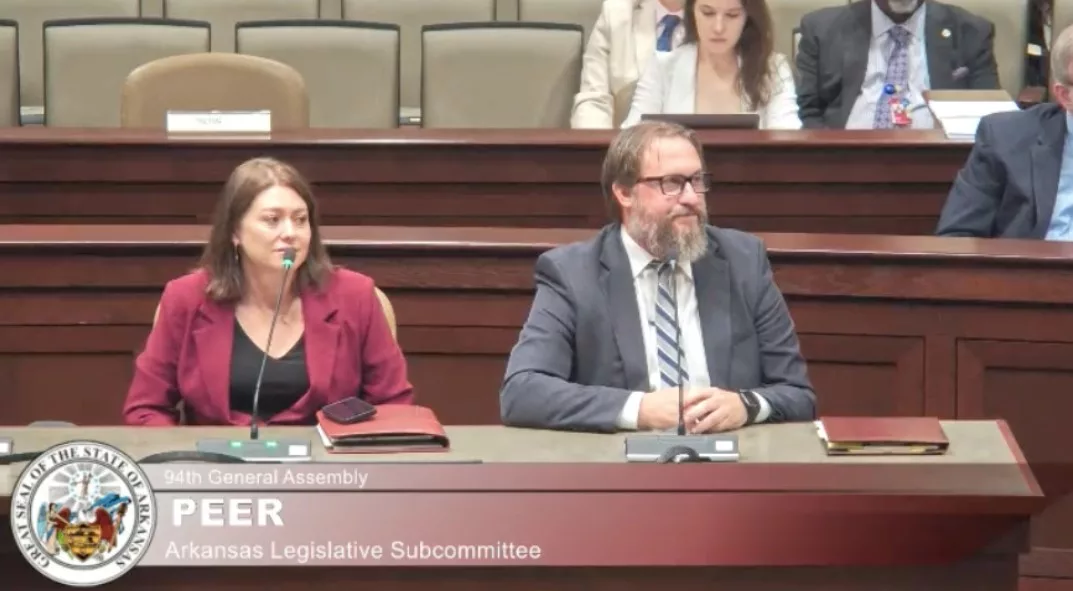
Featured image: Arkansas Department of Education Chief of Staff Courtney Salas-Ford (left) and Chief Fiscal Officer Greg Rogers explain to the Arkansas Legislative Council’s Performance Evaluation and Expenditure Review subcommittee why the department requested $7 million to provide lockers and pouches for students’ cell phones in roughly 180 school districts statewide.
Requested funds cover estimated costs of lockers and magnetically-sealed pouches for roughly 180 districts, ADE officials say
By Tess Vrbin, Arkansas Advocate
Public school districts across Arkansas are expected to be able to lock up students’ cell phones during school hours, with the state Department of Education distributing $7 million to pay for pouches or lockers.
The Arkansas Legislative Council will take up the restricted reserve fund request Friday after the Performance Evaluation and Expenditure Review subcommittee approved it Monday on a voice vote with some dissent.
“This initiative seeks to foster a phone-free environment, enabling an evaluation of its impact on student learning, engagement, and overall student health,” Department of Education Chief Fiscal Officer Greg Rogers wrote to Department of Finance and Administration Secretary Jim Hudson requesting the funds.
The phone restriction initiative is part of a pilot program Gov. Sarah Huckabee Sanders and Education Secretary Jacob Oliva announced in July. The program will also provide grant funding for telehealth mental health services and support for locating mental health providers and navigating insurance matters, according to a news release.
Cell phone policies at Arkansas schools vary among districts and individual classrooms. While some teachers collect phones at the start of instructional time, others allow students to access their devices after completing assignments.
The $7 million allocation is an estimate of the cost of the locking devices based on the number of students in the roughly 180 school districts that have applied to participate in the pilot program, said Courtney Salas-Ford, the education department’s chief of staff.
School districts rather than the state would be responsible for replacing the devices, but metal lockers and magnetically-sealed cloth pouches “have a very long life expectancy,” Salas-Ford said.
The pouches from YONDR, a California-based company with the goal of creating “phone-free spaces,” can be locked and unlocked by separate unlocking devices kept under the supervision of adults while students keep the pouches with them at all times. In July, the De Queen School District approved the use of the pouches for middle school and junior high students as part of its participation in the pilot program.
Sanders has repeatedly advocated for reducing social media use among teenagers, citing concerns about depression and suicide rates.
“Our country has been experimenting with unregulated smartphone use for more than a decade, and unfortunately the results have been absolutely devastating for our young people,” Sanders said at an Aug. 8 press conference at Bentonville’s Ardis Ann Middle School.
Bentonville West High School piloted a program last year that required cell phones to be silenced and stored during class. Bentonville School District Director of Communications Leslee Wright said in July that the initiative was a “remarkable success,” with 86% of staff reporting a positive impact. Administrators also recorded a 57% reduction in verbal or physical aggression offenses and a 51% reduction in drug-related offenses, she said.
YONDR CEO Graham Dugoni attended the press conference, which marked the start of the pilot program a month after it was announced.
“One of the things he said that really stuck with me [is] this isn’t about taking anything away,” Sanders said. “This is about giving students the freedom to enjoy a phone-free education.”
As part of the pilot program, the University of Arkansas’ Office for Education Policy will examine how students’ mental health may be impacted by reduced access to cell phones and social media. A smaller group of districts from the pilot program will participate in the UA study.
In May, Sanders sent a copy of Jonathan Haidt’s book, “The Anxious Generation,” to all state and territorial governors in America, as well as Arkansas legislators. According to the July press release, she expressed support for four main goals: no smartphones before high school, no social media before age 16, phone-free schools, and more outdoor play and childhood independence.
Proposals to reduce smartphone use have been gaining traction across the country, including in California, Florida, Ohio, and Indiana.
A 2023 law that Sanders championed would have been the first in the nation to require minors to receive parental permission before signing up for a social media account. A federal judge blocked the law last August, hours before it was set to take effect.
Arkansas lawmakers might introduce legislation in January requiring all districts to lock up students’ phones during the school day, House Speaker Pro Tempore Jon Eubanks, R-Paris, said during Monday’s PEER meeting.
The Arkansas Advocate is a nonprofit, nonpartisan news organization dedicated to tough, fair daily reporting and investigative journalism that holds public officials accountable and focuses on the relationship between the lives of Arkansans and public policy. Image: Screenshot Arkansas Legislature via Arkansas Advocate
Have a news tip or event to promote? Email White River Now at news@whiterivernow.com. Be sure to like and follow us on Facebook and Twitter. And don’t forget to download the White River Now mobile app from the Google Play Store or the Apple App Store.
Get up-to-date local and regional news/weather from the First Community Bank Newsroom on Arkansas 103.3 KWOZ every weekday morning and afternoon. White River Now updates are also aired weekday mornings on 93 KZLE, Outlaw 106.5, and Your FM 99.5.








